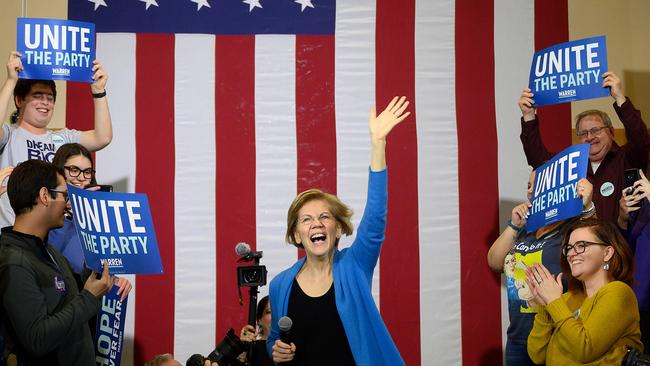Unlike down under, Americans go up and over the top on the campaign trail
In the United States where voting is not compulsory, presidential candidates literally have to woo every voter.

The Des Moines Register tracks the number of events Democratic candidates hold in the state of Iowa in the lead-up to the caucuses on February 3.
Its latest count sits at around 3000. In a state of just over 3 million people, that’s a lot of attention from presidential hopefuls as well as the nation’s media.
It means a lot of corn dogs, handshakes and hugs.
A prolific Iowa campaigner who hasn’t managed to budge much in the polls is Tom Steyer. The billionaire investor has personally ploughed hundreds of millions of dollars into Democratic causes, personally bankrolling the nationwide ad campaigns to impeach Donald Trump.
When I find him, it’s at a barn- turned-bar called the Cider House in Fairfield, Iowa.
Just over an hour south of Iowa City, the two-lane highway was dotted with places to pick up farm supplies as well as a Dollar General Store. A man riding a horse and buggy pulled out at one point, his red hazard lights flashing off the back of the wooden cart on which he was perched.
It’s here in rural Iowa one of the financial elite of one of the wealthiest nations in the world sat facing a couple of dozen country Iowans asking for their vote.
There were frank questions about what chance he really had at winning, how someone so wealthy could understand their struggles and what he would do to fix the health system.
Where else in the world can you expect the country’s political elite to spend months staring each voter in the eye and humbly ask them for their vote, just to get past the first round.
Far from the homespun charm of rural town halls are the mega events held by first-tier candidates across Iowa. The NewBo City Market in Cedar Rapids is home to artisan sausages and craft beers, and more than occasionally a Democratic candidate looking for young, woke voters. Elizabeth Warren swept in during a break from the impeachment trial, to the rapturous support of thousands, mostly women.
Jonathan Van Ness, of Queer Eye for the Straight Guy fame, glided across the stage in stylish platform shoes, speaking of his struggles accessing preventive medication for HIV. The music reeled between pop hits. As Warren bounded on to the stage she stopped to dance with Van Ness. It was clear they had one job: to get people excited.
She whipped the crowd into frenzied applause lashing the President for his corruption and alleged treason. Elicited cheers when she said she’d crack down on drug companies and ban offshore drilling by executive order overnight if she became president. Most importantly, she implored them to get out and vote.
It’s not enough to get people to agree with you in the United States. You need them to vote for you when there’s no obligation to show up, and you do that by getting them really worked up about something, anything.
That has to be the single biggest difference between the US and Australia. About 60 per cent of people turned out to vote in 2016, compared with Australia (where voting is compulsory) where about 91 per cent of us voted last time around. Iowa, however, is a little different.
The Iowans I’ve spoken to are fairly blase about the number of politicians they’ve met. Whether it was catching Barack Obama outside the Iowa City Hilton or kicking back with Bernie Sanders at the recreation centre in Ottumwa, everyone has their story of meeting a big political player and it’s never anything to brag about. While these opportunities are commonplace, they’re not taken for granted.
They know how valuable their votes are and take it seriously. At each campaign event I attend voters tell me they’re considering candidates and can generally list in order who they prefer and why all the way up to seven or eight people. Their support for the Democrats is mostly assured but the candidates still have to earn it.
It means the divides can begin to show. One couple tell me of a dinner party they hosted for their friends, all Democrats. When two guests found out they’d donated to Tulsi Gabbard, they upped and left their seats halfway through the meal. They simply couldn’t stomach her previous anti-gay stance or the company they were keeping that might abide it. That’s all before you even cross the divide between Republicans and Democrats.
My own relatives are spread out across the midwest of America. All vote differently. As we were sitting back to have drinks one evening the discussion inevitably turned to politics. After a while one cousin coyly admitted they’d taken their Trump bobble head off the mantle above the fire place for fear they might offend me. Perhaps not too attuned to Australian sensibilities they hadn’t thought to move the skeet shooting shotguns that leaned against the same mantelpiece.
A Wisconsin voter put it to me best. She was speaking to me about why the African-American voter turnout was so low, and her own experience being a black woman in Wisconsin. She admitted, with a wince, that she forgot to vote in 2016, saying “I got really, really busy and honestly I thought I didn’t have to. I thought we had it in the bag”.
She described experiencing increased racism and bigotry, which she attributed to Trump’s wild rhetoric, and feeling isolated in her community. She’s mad. And you can bet she’s going to make sure she votes in 2020.



To join the conversation, please log in. Don't have an account? Register
Join the conversation, you are commenting as Logout